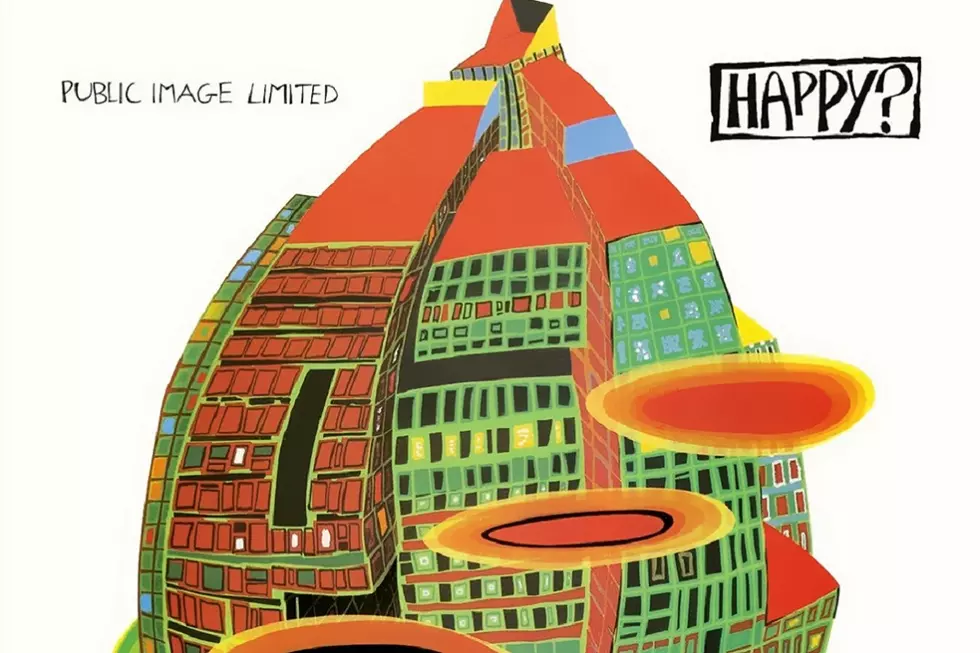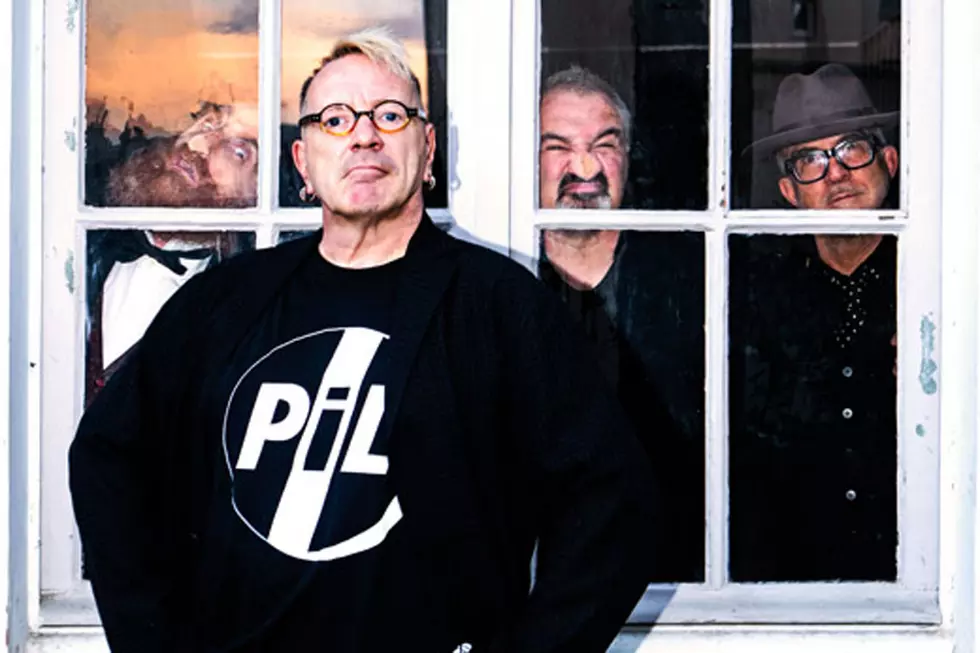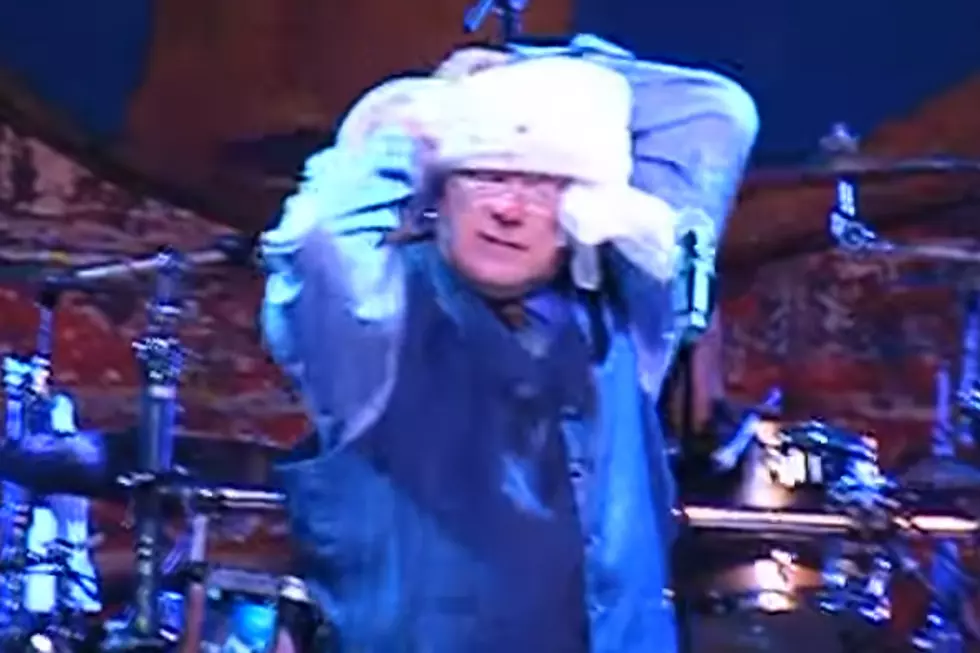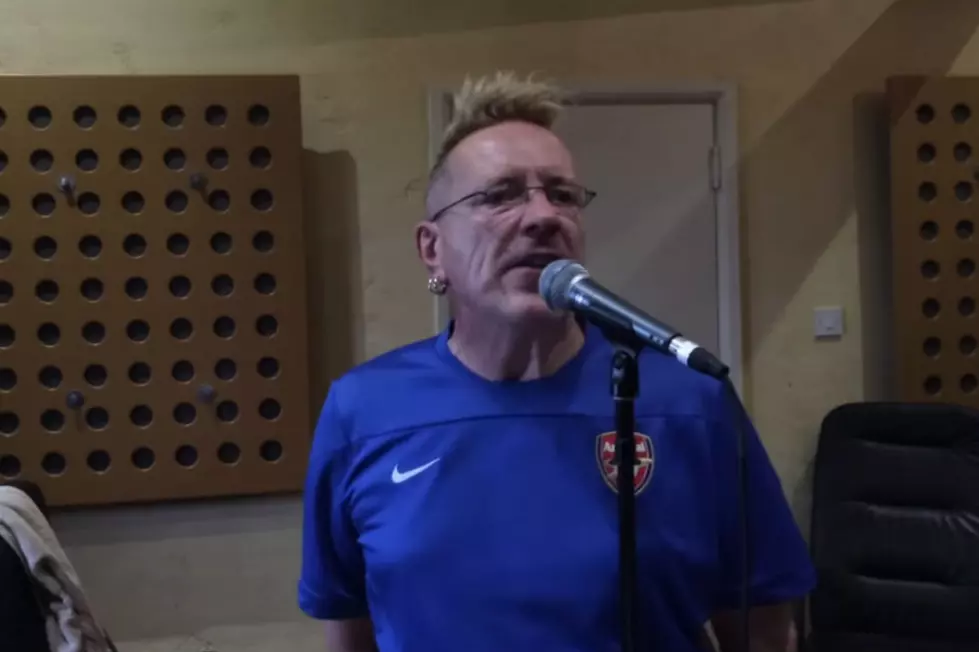
John Lydon On the Return of Public Image Ltd., Why Voting for Mitt Romney Makes You ‘A F—ing Idiot’ – Exclusive Interview
John Lydon, aka Johnny Rotten, is staying true to some of the first words he uttered after launching the post-punk group Public Image Ltd. in 1978: “I will not be treated as property.”
The group released 'This Is PiL,' their first record in 20 years, back in May on the their own label, and the former Sex Pistols frontman and punk icon is determined to remain independent. Having wrapped the European leg of the tour supporting the new record, Lydon and PiL bandmates Scott Firth, Lu Edmonds and Bruce Smith dive into an expansive North American tour this week. Checking in with Diffuser.fm from his home in London, Lydon talked about music, politics ("If you vote for Romney, you're a f---ing idiot!") and his strong connection with children. Despite suffering from a head cold and facing the prospect of an early flight, the 56-year-old proved anything but rotten.
Now that you have the new record to promote, do you feel like PiL is getting back to where you left off in 1992?
We’ve played now for almost two years continual, mostly in Europe. We did a few gigs last year in the States. But we have to expand in America, because we don’t view ourselves as a particularly English band. Our drummer’s American. I live in California. Lu lives in Siberia and our bass player’s Scottish. We come from many different backgrounds. I think it lends well to how open and enticing the music is … and experimental.
It must feel really good to be playing new music again …
Yes, but we didn’t get record company support. We put our own label together and went to distribution because the industry is very, very against new ideas. It always has been. When I first started PiL some 30-plus years ago, it was incredibly difficult to get the record companies to pay attention to this kind of music, and it still is. And yeah, they love to sign bands that do watered down versions of what it is we create. It’s quite amazing when I listen to, say, the top 30 over the last 30 years, how much sampling of Public Image ideas is actually predominant in pop culture.
Knowing the challenges and obstacles faced by putting out your own record, are you sure this is how you want to continue?
Well, yes, because what we wanted to do is record the album in as live of a format as is technically possible in a recording studio. So what we did was, we rented a barn, which was a rehearsal space in the middle of the British countryside.
Steve Winwood’s barn, wasn’t it?
Yes, a nice, little cozy environment, really … if you like sheep. There were 20,000 of them surrounding the building.
Was that Scott’s hookup?
Oddly enough, it wasn’t through Scott. It was through a road manager who also works with us. You have to understand in the music industry, us as artists, or whatever you want to call us, we all do know each other one way or another. The interconnections are always there. One of the very first houses I ever bought when I had the money was off Steve Winwood. I was quite happy to accuse him of being a slum landlord [laughing].
How is it switching gears so frequently, going between the U.K. and U.S.?
The length of the flight is one thing, but just to deal with the people at the immigration when you get in or leave a country, it’s quite insane. There’s still a suspicion on me and my travels. No matter what I can’t seem to be welcome anywhere.
Have you thought about unspiking your hair or wearing a moustache disguise?
Listen, I’m John. No matter what I do, it will be John, you know? I work with what my parents gave me.
At this point, you’ve gone through the process of becoming a U.S. citizen …
Oh yeah. But that doesn’t make it any easier. It’s suspicion of political activities. I’m very open about my politics, and I don’t believe in any political party at all, none of them.
Of what significance is it that you happen to be touring during election season?
It’s rather convenient, really. It gives me the opportunity to say [laughing], "If you vote for Romney, you’re a f---ing idiot. You cannot back the big money, not in anything in life. It will always go wrong on you."
I might be seeking asylum somewhere if Romney gets elected.
That’s a terrible thing to say. But you’re not alone, you know. I’ve talked to many American journalists who feel that way. But nobody seems to be doing anything about such an imminent problem on the horizon -- bigotry and false family values and the whole Republican agenda. It’s very dangerous for us that want to live in the modern world. I think we can take for granted that the Republican voters vote Republican regardless, but it’s the don’t-knows that cause the problems. And what don’t you know about that? That’s a man with a load of money telling you you’ve had enough.
You played a number of sold-out gigs and big festivals this summer. How has the new record been received?
Always, always an amazing, positive reaction. That’s very heartwarming, because what we do is very complicated and difficult because of how we do it. We’re outside of the agenda. We don’t have large record company backing. I never did, really. But in the current climate of money being tight, it’s very, very difficult indeed. To try to get promoters to back or support an act as independent as ours, it flies in the face of their business model. So there you go. Basically I’m dealing with Romneys all over the place.
So what happened with (PiL’s long-standing UK label) Virgin Records, and why the 20-year hiatus?
Virgin records slowly but surely dissipated. It wasn’t them; it was other labels, too. Whoever was running the heads of department, they were all replaced, so I lost any personal contacts and they passed me on to the accounting department, which from that point on kept me in incredible debt. Meaning that unless record sales recouped the advances they thought they’d given me, they weren’t going to press any new records or allow me to record. It’s catch 22, and you can’t get out of it. You just have to learn patience. So slowly but surely, I’ve had to claw my way back, raise a little here and a little bit there and put that against those outstanding problems.
It just seems like PiL was at a point of such high momentum …
Yeah, when they pulled the plug on us. It all kind of collapsed around when … you see, there were promises when I did the Sex Pistols reunion tour in 1996. There were promises that they would back PiL afterwards if I would support that tour. Well, I did, and they let me down on every single promise. They left me really high and dry and stranded. And that’s why there will be no Sex Pistols reunion ever again.
The ‘Never Mind the Bollocks’ reissue …
It’s nice Universal are re-releasing the old Pistols catalog. I’ve no problems with that. But I find myself in competition with myself. I’m with new PiL. Which do you want, the old me or the new me?
People love to live in the past …
It’s always been the case with PiL. It takes people a long time to catch up to what it is we’re doing.
When you were re-launching, of all of PiL’s many lineups over the years, you chose Bruce and Lu …
They’re my favorite people to work with. We know each other so well. They’ve worked the longest in any PiL format and it was obvious for them and me.
How much input do you have in the instrumental development of the songs?
Everything, anything -- all of us, we share. It’s a great deal of thought that goes into what we do … very, very long discussions. There’s nothing lighthearted about this. The written word must match the musical picture. The terrain must be completely adept at the emotions you’re trying to get across. The subject matter is completely relevant to every single song. Things evolve around that. It’s like painting a picture, you know? You’ve got to have a good paint supplier.
'This Is PiL' has a few tracks that come across as overtly non-emotional, but then you’ve got something like 'Deeper Water,' which is just rife with feeling.
That’s a very heartfelt subject. Me and Lu share very close bonds on the subject matter in that. There’s about 20 different things going on at the same time, but simply put, Lu’s background and family are admirals and navy and seafarers. It was a good juxtaposition of events to explain the way that we fight oppression and mediocrity and how we use the water and the sea as a cleansing agent.
How does your Civil War fascination play into the record?
That was 'Out of the Woods,' which is a song from the black confederate’s point of view. I was putting myself in that position of, what would it take for an African American to have volunteered for the South, and I found there was a lot of history that was incorrectly told as far as what the Civil War was really all about. There’s much bigger pictures to unravel in all of this. Regardless of race, creed and color, to me, you’re a human being, and the reason you do things are obviously valued to me. I’ve learned from that. That’s what the song is. It’s an experiment in positioning yourself in someone else’s psyche, and thereby resolving some inner issues of your own.
When you look at a record like 'Second Edition,' it seems like songwriting used to be a lot more about your personal emotional experience.
It’s a learning process, life. And as you approach each period of your life, you have to relate directly to it. I’m a human being, and I’m constantly evolving. This is the gift of life. I’m not one to remain static or imitate myself. We play many of the PiL sets live, the whole gauntlet of it from start to finish, sometimes from many different albums. But each time live, the songs take on different experiences, always because of the crowd’s reaction and involvement. A PiL zone or a PiL gig is a very warm event.
One of the most memorable shows in my life was PiL at Red Rocks, Colorado, in 1989. Do you happen to remember being accosted afterwards by a pair of 11-year-old girls wanting your autograph?
Aw, you sweet thing! [Laughing]. I’m sure I was very appropriate.
You were, actually. I was a bit nervous.
No, you should never be nervous about saying hello to Johnny. Johnny means no harm to no one.
I had read somewhere that you liked kids, so that made me feel braver.
My mother was sick a lot of times when I was young so I had to really look out for my brothers, who are all younger than me. I’m a natural caretaker of children. One of my first jobs -- before the Pistols -- was looking after problem children.
How has parenting been for you?
The twins now are nearly 30, and I hope I’ve raised them well. There’s always been children in my life because they’re the most important aspect of being a human. Although Nora and I, we can’t have any of our own due to an accident way back when, which I don’t want to talk about too much … but always children in the house. Always welcome.
What’s the demographic of a PiL audience these days?
Varied. It’s very varied. I don’t want to see – which happened on the Pistols reunion tour – the first 20 rows wearing identical uniforms, all dressed how I used to in 1977. What I was preaching is individuality and still -- I apologize for the long break -- I manage to be an in-di-vi-du-al. The PiL audience, I’m pleased to say, consists of all races, all ages, all political beliefs.
The distribution of music has changed tremendously in 20 years. How do you feel about downloads versus hard copies?
For me, I’m a record buyer. I love the personal connection I feel with every band, and you can only really get that complete experience with buying the record.
What records have you bought recently?
I buy constantly. But the last three or four months I’ve paid no attention, because I’ve been so busy. Just to run a 24-hour-a-day independent business -- the amounts of laws and legal problems of trying to make music -- the system doesn’t want you to. I’ve no time at all to buy music lately. But last night we did a TV show here in England -- Jools Holland -- and the Beach Boys were on as well. It was great to hear them harmonize. It was just like an original Beach Boys concert. Muse was in the studio, too. I liked us all getting on well with each other. It was very compromising for me, because I had this head cold. I was croaking a bit, croaking like a donkey. But I was in good company. [Laughing]
Maybe you should drink some tea to prevent further croaking. I’ll let you get back to your packing. It’s been an honor to speak with you.
May the road rise to meet you, and may all your enemies stay behind you always. Peace.
More From Diffuser.fm









